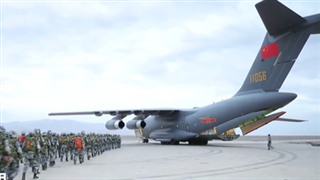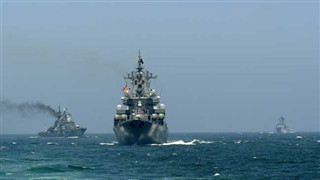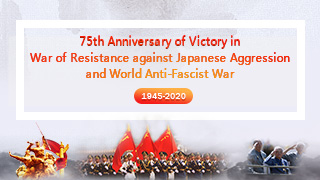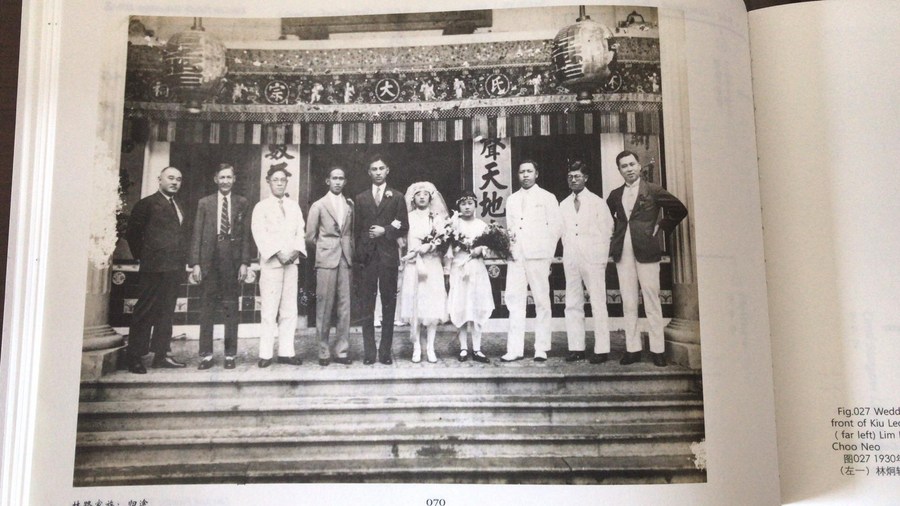
by Li Xiaoyu, Xia Lixin
SINGAPORE, Sept. 2 (Xinhua) -- Young people should always be loyal to the country, study hard, and fight when circumstances arise, Leow Oon Geok said when being asked what she would like to tell the young generation as the daughter of a Singapore anti-Japanese hero.
Her father Lim Bo Seng was remembered as one of Singapore's war heroes. According to the Singapore Bicentennial Office, he participated in anti-Japanese activities in Malaya and Singapore during World War II, and was captured by Japanese invaders in Ipoh in 1944, which led to his death at the young age of 35.
"When my father wrote this diary, he was dying. He wrote to my mother saying 'do not grieve for me, tell the children what has happened to me and bring them up in my footsteps'," said Lim Lam Geok, son of Lim Bo Seng.

PROMINENT BUSINESSMAN
Lim Bo Seng was born in Nan'an, southeast China's Fujian province in 1909. He came to Singapore when he was 16 and received English education at the Raffles Institution. After that, he went on to study business at the University of Hong Kong.
He had to cut short his study in Hong Kong and came back to Singapore at the age of 20 after his father, a well-known architect and businessman, passed away for illness. Lim was the first son of his family and he had lots of siblings.
"The family is very very big, and he was responsible for running the businesses and making sure that they have enough money to support all the family members," said the 88-year-old Leow. "So that was a big responsibility."
Lim came back to Singapore in 1929 and took over the leadership for the whole family, as well as the Lim family's biscuit factory and brickworks. Later he ventured into the construction industry. According to Lim Whye Geok, another son of Lim Bo Seng, within the years before the Japanese troops came, his father became quite a prominent businessman.
In that period, Lim was the president of an organization currently known as the Singapore Contractors Association Ltd and a board member of the Singapore Chinese Chamber of Commerce and Industry. Besides, Lim Bo Seng became the executive member and education director of the Singapore Hokkien Association.
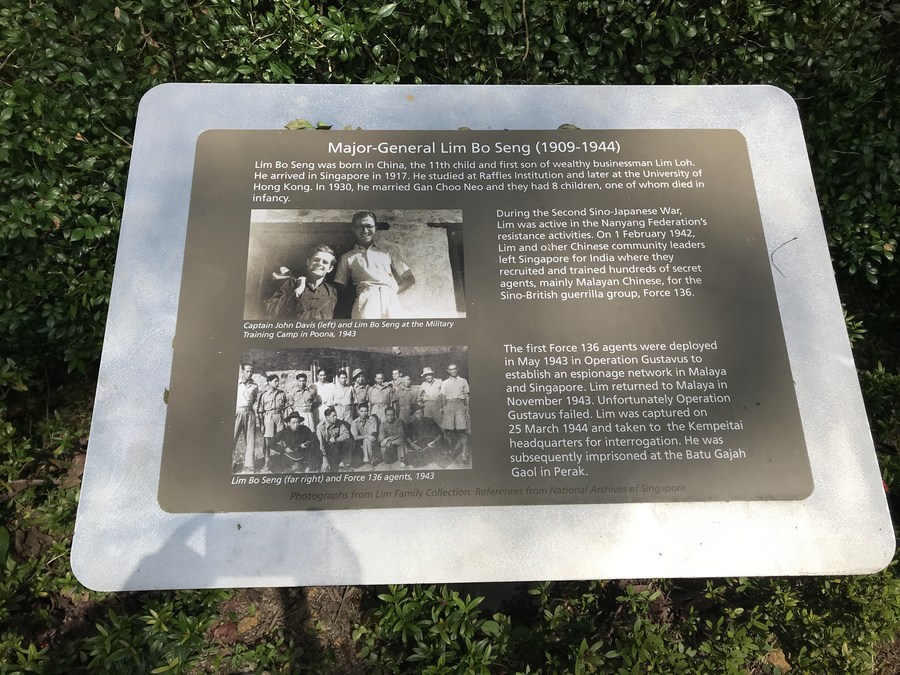
FAMOUS ANTI-JAPANESE ACTIVIST
Lim participated in anti-Japanese activities in the 1930s. The Singapore Bicentennial Office said he donated money to the Chinese Relief Fund and joined the boycott against Japanese goods.
Lim Whye Geok told Xinhua that when the Nanjing Massacre started in December 1937 and around 300,000 Chinese civilians and unarmed soldiers were brutally killed by Japanese troops in over six weeks, his father became very upset. He was increasingly involved in anti-Japanese activities from 1937. His children could hardly see him, because he was always out until quite late at night.
Leow recalled that his father once organized a fundraising activity in Singapore and asked people to go on the street and sell flowers to raise money to send back to China.

He also went to a Japanese-owned tin mine in Malaya, a important source of military supply for Japanese troops, and organized some 3,000 Chinese workers there to go on strike.
Lim met the workers there and told them that the tin was shipped to Japan as a raw material to make weapons, and the weapons were used to attack China. He convinced the workers to go on strike and eventually managed to bring all of them back to Singapore, where he found jobs for them and helped them get accommodations.
During Japan's bombing of Singapore, the British authorities in Singapore at that time approached Lim to organize the Chinese community there to do voluntary work.
Shenton Thomas, then Governor of the Straits Settlements, asked Lim to form the Chinese Liaison Committee to assist the British in civil defense. Lim organized more than 10,000 men to erect defenses around Singapore after the fall of Kota Bharu. As the Japanese advanced towards Singapore from Johor, he and his team blew up the causeway, effectively slowing the enemy's movement, according to the Singapore Bicentennial Office.

RESPECTED BY COMRADES
Lim left his wife and children a few days before Singapore fell into the hands of the Japanese invaders. He wrote in his diary that he was offered places for himself and his family to flee Singapore, but he decided not to accept this offer, as "accommodation was insufficient for everyone and their families."
Lim and some Chinese community leaders went to Calcutta, or Kolkata of India today, where he participated in the establishment of Force 136, a guerrilla task force jointly set up by China and Britain. Lim came to southwest China's Chongqing in 1942 to recruit Asian Chinese youths for the Force 136.
Lee Kim Chuan, a comrade of Lim Bo Seng, wrote in the book The Price of Peace that Force 136 tried to recruit Malayan Chinese youths from the provisional wartime capital of China and the city of Kunming and sought volunteers from the Central Military School in China. More than 100 people were recruited in all, and they underwent training in India before being sent to Malaya for underground battles against the Japanese army.
Lim also travelled to Malaya in 1943 to establish an intelligence network. Unfortunately, he was captured by the Japanese and jailed in the Batu Gajah prison in 1944. Despite of being tortured, he refused to provide any information about Force 136 to the Japanese invaders and staged a hunger strike in protest against the ill treatment of his comrades in prison.
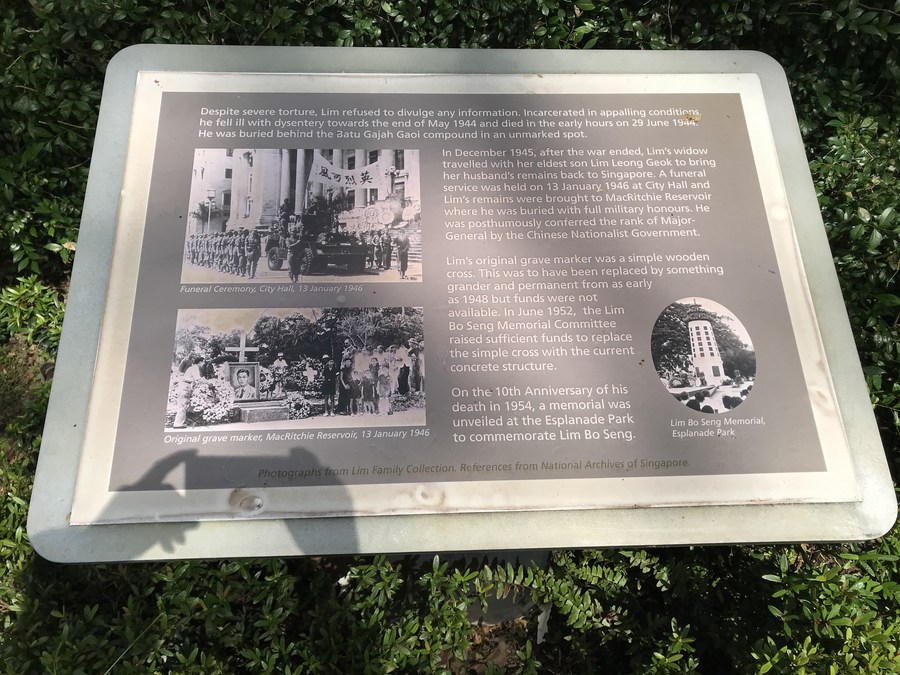
Tan Chong Tee, Lim's comrade who was also jailed in the prison at that time, wrote in his book Force 136: Story of a WWII Resistance Fighter that Lim still showed much concern for his comrades even when he himself was in danger.
"He implored the guards to distribute his food which was left at his cell door to the rest of us," Tan wrote. "I was deeply touched by his noble character and kept persuading him to eat. Bo Seng's selflessness moved the guards too. Some of them became our messengers."
Lim died on June 29, 1944, at the age of 35. His remains were moved to Singapore by his wife and eldest son in 1945 and buried in MacRitchie Reservoir in January 1946.
Today, people can recall his heroic deeds by visiting the Lim Bo Seng Memorial at Esplanade Park in Singapore, or the places named after him, such as Bo Seng Avenue in Singapore and Jalan Lim Bo Seng in Ipoh, Malaysia.
"My father's story has always been a great inspiration for us and our children. I hope the young generation will be grateful and cherish what we have today and will stand up bravely for the country when needed," said Leow.


